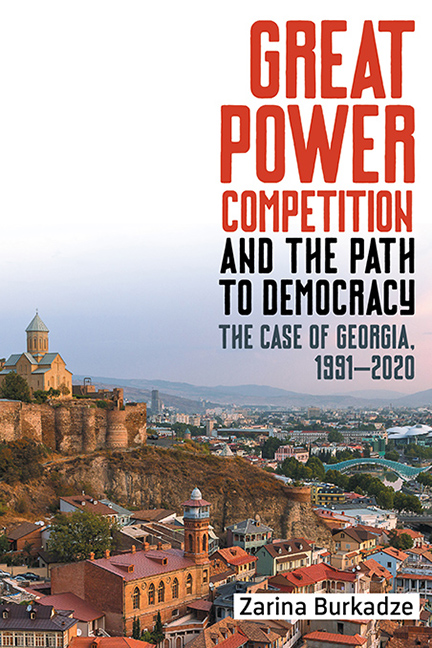Book contents
- Frontmatter
- Contents
- Preface
- List of Acronyms and Abbreviations
- Introduction: The Puzzle of Georgian Democratization
- 1 Autocracy and Democracy in Georgia: What Made the Difference?
- 2 Democratization without Great Power Competition, 1991–1993
- 3 Pluralizing Geopolitical Space, 1993–2003
- 4 The Dictatorship of Democrats, 2003–2012
- 5 Democratic Arrival? 2012–2020
- 6 Democracies In-Between
- Conclusion
- Appendix: List of Interviews
- Bibliography
- Index
Preface
Published online by Cambridge University Press: 16 July 2022
- Frontmatter
- Contents
- Preface
- List of Acronyms and Abbreviations
- Introduction: The Puzzle of Georgian Democratization
- 1 Autocracy and Democracy in Georgia: What Made the Difference?
- 2 Democratization without Great Power Competition, 1991–1993
- 3 Pluralizing Geopolitical Space, 1993–2003
- 4 The Dictatorship of Democrats, 2003–2012
- 5 Democratic Arrival? 2012–2020
- 6 Democracies In-Between
- Conclusion
- Appendix: List of Interviews
- Bibliography
- Index
Summary
My childhood memories stirred up my curiosity about the process of democratization and democracy promotion. In 1992, war erupted in the region of Abkhazia in Georgia where I was born. After months of hostilities, the Russian Air Force carried out air strikes against ethnically Georgian villages and cities. My parents relocated us to the other side of Georgia. When we arrived in the southwestern coastal town, we encountered foreigners with heavy American accents greeting us in Georgian and offering humanitarian aid. Their behavior awakened my childish curiosity, and the very first question I asked my parents was why the Russians bombed Georgia but also why the Americans had helped the country. At that age, I had no idea that Europe existed. My parents did not answer me, they only smiled and placated me. But those questions would stay with me long after the war ended.
Many people supported my enthusiasm and encouraged me on this challenging path of writing a book about Georgian democratization. First of all, I am grateful to my mentor, Professor Sharon Wolchik, who is an excellent political scientist and has deep knowledge about the topic and the region. Her coauthored book Defeating Authoritarian Leaders in Post-Communist Countries was an inspiration for me. When I wrote her from Georgia explaining that I would welcome her guidance in expanding an early version of this project into a book, Sharon accepted my request without hesitation. She offered constant support throughout the writing process. She is an inspiration and role model.
I am sincerely grateful to the Fulbright Scholar Program, Institute of International Education, the US State Department, and the US Embassy in Georgia. I want to thank Margo Squire, a distinguished foreign service officer, who interviewed me during the selection process and gave me the chance to become a better scholar. I want to thank the Institute for European, Russian, and Eurasian Studies and Elliot School of International Affairs at George Washington University. The IERES team provided me with an academically stimulating environment that facilitated my growth as a scholar. I am thankful to Matthew Kewley for his assistance throughout my Fulbright visit at George Washington University's Elliot School of International Affairs. I also want to thank Nancy Mayer, who proofread several chapters of this book.
- Type
- Chapter
- Information
- Great Power Competition and the Path to DemocracyThe Case of Georgia, 1991-2020, pp. vii - viiiPublisher: Boydell & BrewerPrint publication year: 2022

